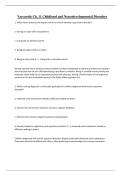Exam (elaborations)
Varcarolis Ch. 11 Childhood and Neurodevelopmental Disorders
- Course
- Institution
Varcarolis Ch. 11 Childhood and Neurodevelopmental Disorders 1. Which factor presents the highest risk for a child to develop a psychiatric disorder? a. Having an uncle with schizophrenia c. Living with an alcoholic parent b. Being the oldest child in a family d. Being an only child ️c....
[Show more]



